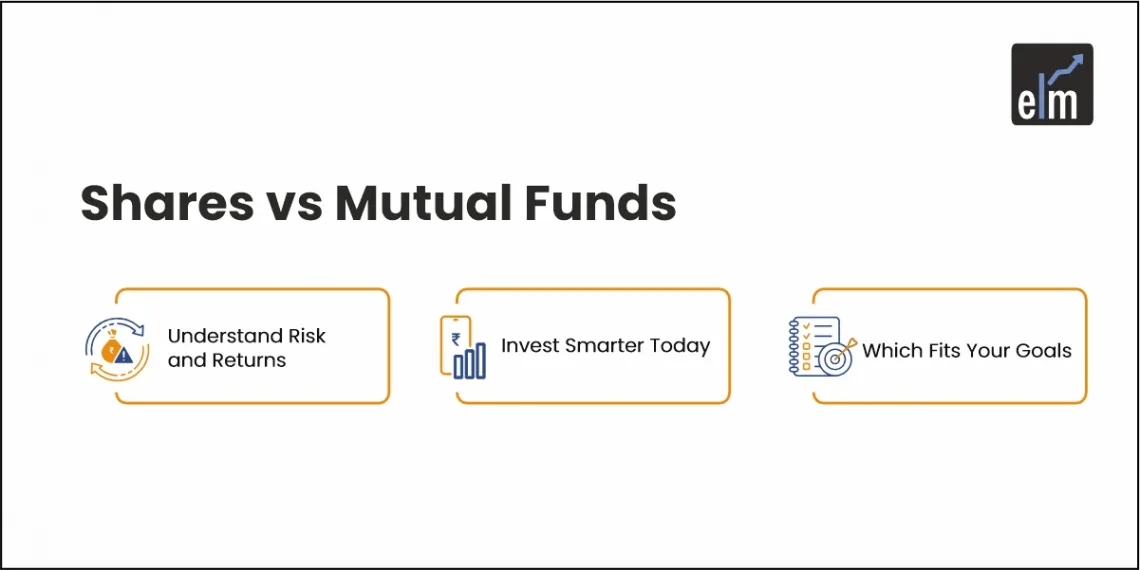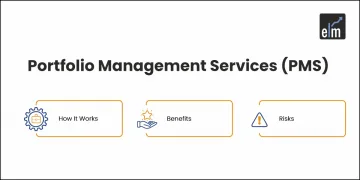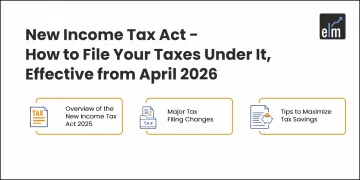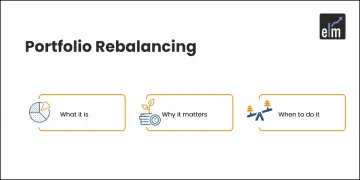Remember when investing meant walking into a bank and filling out forms?
Those days are long gone. With over 15 crore demat accounts, monthly SIP contributions exceeding ₹25,000 crore, and passive funds handling assets valued at over ₹10 lakh crore, the Indian stock market today presents an entirely different picture.
Despite all these numbers and options, most inexperienced investors still have to decide whether to buy individual stocks or use mutual funds.
Consider this real situation. In 2021, Raj, a 28-year-old software engineer from Bangalore, contributed ₹50,000 to Zomato’s IPO. An extra ₹50,000 was given to a Nifty 50 index fund.
In Zomato’s initial public offering (IPO) in 2021. A Nifty 50 index fund received an additional ₹50,000. In 2026, he had completely different experiences with both. The investment in Zomato? A rollercoaster that can be exhilarating at times and frightening at others.
The index fund? Steady, predictable, maybe a bit boring, but it helped him sleep better at night.
That’s the classic dilemma right there. Shares give you the thrill of picking winners (and the pain of backing losers). You’re betting on individual companies – TCS, Reliance, HDFC Bank, whatever you believe in. Mutual funds spread your money across dozens or even hundreds of stocks, with professional fund managers calling the shots.
Both approaches work. Both have made people wealthy. The question isn’t which one is better, but which one fits YOU better.
In this article, we’ll focus mainly on Exchange Traded Funds (ETFs), which are mutual funds that track specific indices or sectors. We’ll put shares and ETFs side by side so you can see exactly what you’re signing up for with each option.
What are the Differences Between Shares or Mutual Funds?
1. Definition
Buy 100 shares of Reliance Industries, and you own a tiny piece of that massive conglomerate. That’s it. That’s a stock direct ownership in one company. Your fortune rises and falls with Mukesh Ambani’s empire.
An ETF? Completely different animal. Take the Nippon India ETF Nifty BeES. Buy one unit, and you’re instantly invested in all 50 companies that make up the Nifty index, from Infosys to HDFC Bank to Asian Paints. The SBI ETF Gold works the same way, except it tracks gold prices instead of stocks. One investment, but you’re betting on an entire basket.
2. Value
Stock prices jump around all day. Check HDFC Bank’s price at 9:30 AM, then again at 3 PM different numbers. Why? Because thousands of traders are buying and selling based on news, rumors, quarterly results, or just gut feeling.
ETF prices move too, but for different reasons. The Nippon India ETF Nifty BeES goes up when the Nifty 50 companies collectively do well. It goes down when they don’t. Simple math, no drama.
3. Investing Style
Picking stocks? Get ready to do homework. You’ll read annual reports, watch management interviews, track quarterly earnings, follow industry trends. It’s like running a small research firm from your laptop. Some people love this. Others find it exhausting.
ETFs let you be lazy (in a good way). Buy the Motilal Oswal Nifty Bank ETF, and you’re done. No need to figure out whether ICICI Bank will outperform HDFC Bank next quarter. The ETF owns both, plus all the other major banks.
4. Rights to investors
Own even 10 shares of TCS? Congratulations, you can vote at their annual general meeting. You’ll get notices about company decisions. You’re technically part of the ownership structure.
ETF holders don’t get any of that. You can’t vote in Infosys meetings just because your Nifty 50 ETF holds Infosys shares. You’re one step removed from actual ownership.
5. Types
Stocks come in flavors. HDFC Bank has regular equity shares that most of us buy. Some companies issue preference shares that get dividend priority. There are redeemable shares and convertible shares. The list goes on.
ETFs? Even more variety, but organized differently. Want exposure to gold without buying jewelry? SBI ETF Gold. Bullish on Indian IT companies? ICICI Prudential Nifty IT ETF gives you Infosys, TCS, Wipro, and the whole gang. Think banking will boom? Motilal Oswal Nifty Bank ETF covers that. There are ETFs tracking everything from the Sensex to international markets to specific themes like electric vehicles.
But the real difference? Risk and returns. That’s where things get spicy.
Take Trent – the Tata company that runs Westside and Zudio. If you’d bought Trent shares in January 2020 at around ₹400, they’d be worth over ₹6,000 by early 2026. That’s a 15X return in six years. Insane wealth creation. But that’s cherry-picking the winner. For every Trent, there’s a YES Bank that destroyed portfolios.
Individual stocks can beat inflation by miles when you pick right. Some even outpace their entire sector. Bajaj Finance has crushed the broader financial sector’s returns. Zomato went from ₹76 at IPO to wherever it is today with wild swings both ways.
Your returns come three ways: capital gains when you sell higher, dividends that hit your bank account quarterly or annually (Infosys and HUL are solid dividend payers), and bonus shares that companies like Reliance occasionally throw your way.
ETFs play a different game entirely. They’re not trying to beat the market; they’re trying to match it. The UTI Nifty 50 Index Fund aims to give you whatever return the Nifty 50 delivers. If the Nifty goes up 12%, you get roughly 12% (minus a small expense ratio). If it drops 8%, so does your investment.
That diversification is your safety net. When YES Bank collapsed, anyone holding a banking sector ETF felt the pain, but it was cushioned by their holdings in HDFC Bank, ICICI Bank, Kotak Mahindra, and others. You never get completely wiped out.
But don’t assume all ETFs are safe bets. Some are wildcards. A PSU bank sector ETF can swing violently based on government policy.
Small-cap index ETFs are just as volatile as individual small-cap stocks. Crypto ETFs (where available)? Forget about sleeping peacefully. Meanwhile, something like the HDFC Index Fund – Sensex Plan tracking 30 blue-chip companies? That’s about as stable as equity investing gets.
Should We Invest in Shares or Mutual Funds?
Wish we could give you a straight answer, but we can’t. Because it depends entirely on who you are.
Stocks still rule for people who want skin in the game, actual ownership in companies they believe in. But the shift happening right now is massive. Young investors, especially those in their 20s and early 30s, are piling into ETFs and index funds like never before.
Walk into any Zerodha or Groww office and ask them about trends. They’ll tell you passive funds have exploded, we’re talking ₹10 lakh crore in total assets now. That’s not pocket change. And every month, like clockwork, over ₹25,000 crore flows into SIPs. People are automating their investments, setting up monthly contributions, and basically forgetting about it.
But here’s the flip side. Direct stock investing has also boomed. We’ve gone from maybe 4-5 crore demat accounts a few years ago to over 15 crore now. Everyone and their cousin is buying stocks. The apps have made it stupidly easy buy shares while you’re waiting for your coffee.
Funds like Parag Parikh Flexi Cap are seeing massive inflows because they’ve delivered consistent returns without too much drama. Same with SBI Bluechip Fund and ICICI Prudential Equity & Debt Fund. People want that steady performance without constantly checking their portfolios.
So what actually matters when you’re deciding? Three things, and be honest with yourself about each one.
First, risk tolerance. Can you watch your ₹1 lakh investment drop to ₹70,000 and not panic-sell? If yes, individual stocks might work. If that thought makes you nauseous, stick with diversified funds.
Second, what returns do you need? Trying to double your money in two years? You’ll need to take concentrated bets on individual stocks (and accept you might lose instead). Want to build wealth slowly over 10-15 years? Index funds have historically delivered 10-12% annually with way less stress.
Third, how much time and interest do you have? Love reading company reports on weekends? Enjoy tracking management commentary and industry trends? Great, you might be a natural stock picker. Can barely keep up with work and family? ETFs and mutual funds exist for people like you (like most of us, honestly).
Don’t skip the research phase. StockEdge Web gives you detailed breakdowns of both stocks and funds. Use them. Read up. Understand what you’re buying.
Check the costs too. Mutual funds charge expense ratios usually 0.5% to 2% annually. Stock trading has brokerage fees, STT, and GST. Run the numbers.
Here’s what a lot of smart investors actually do, they mix both. Keep 60-70% in something stable like the UTI Nifty 50 Index Fund or Axis Bluechip Fund. That’s your foundation. Then take 30-40% and buy individual stocks you really believe in, maybe HDFC Bank because you think banking will grow, or Bharti Airtel because of the 5G story, or Titan because jewelry demand isn’t going anywhere.
This combo gives you the best of both worlds. Your core stays safe. Your satellites swing for the fences.
So, which product have you recently invested in – Shares or Mutual Funds, and why?
Conclusion
Stocks have been around since the East India Company days. Mutual funds and ETFs? They’re the new kids, but they’ve proven themselves. Both can make you money. Both can fit into a smart portfolio. The trick is knowing yourself, your risk appetite, your time constraints, and your financial targets.
Stop looking for the “perfect” investment. It doesn’t exist. Figure out what lets you sleep at night while still moving toward your goals. That’s your answer.








Good article …thank you
Hi,
Thank you for reading our blog!!
Keep Reading!